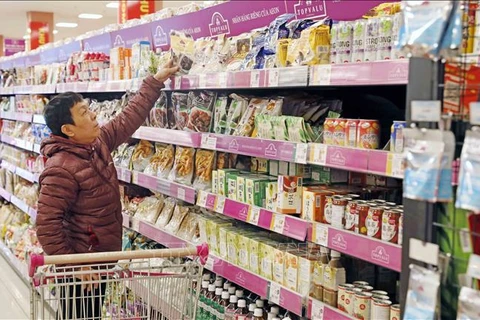
Hanoi (VNA) – Vietnam’s consumer price index (CPI) rose by 4.08% in the first half of 2024 compared to the same period last year, while core inflation increased by 2.75%, according to the General Statistics Office (GSO).
The GSO defined several factors contributing to the CPI growth, which included the respective annual 4% and 5.51% increases in the prices for the groups of food and food services as well as of housing, electricity, water, fuel, and construction materials.
Meanwhile, household electricity prices jumped 9.45% due to higher demand and adjustments in the average retail price of electricity by the Vietnam Electricity (EVN) in 2023.
The price of the education group rose by 8.58% as a result of higher tuition fees in some localities during the 2023-24 academic year, and that of medicines and healthcare services grew 7.07% following adjustments in healthcare service fees.
In contrast, the index for the postal and telecommunications group decreased by 1.41% year-on-year, as the prices of older generation phones dropped when businesses applied discount programmes to promote smart phones in the market.
Six-month core inflation expanded 2.75% over the same period in 2023 and was lower than the general average CPI (over 4%). The GSO largely attributed it to rising costs of food, electricity, education, and healthcare services, which affect CPI growth but are excluded from calculating core inflation.
According to Nguyen Thi Thu Oanh, Director of the GSO’s Price Statistics Department, the global economy is limping along with slow growth, challenges in short- and mid-term development prospects, and high interest rates, among others.
In the first six months of this year, the world commodity market experienced strong fluctuations due to strategic competition between major countries, the ongoing military conflicts between Russia and Ukraine and in the Gaza Strip, and escalations in the Red Sea.
In addition, epidemics, climate change, and natural disasters, especially heat and drought due to the El Nino phenomenon, led to a potential risk of food insecurity in some countries and regions.
In Vietnam, the inflation rate has been curbed at a rational level to back economic growth, she said, adding the Government and the Prime Minister have directed ministries, sectors, and localities to implement various measures to resolve difficulties, promote growth, maintain macroeconomic stability, control inflation, and closely monitor the supply-demand and prices of essential goods to implement appropriate measures.
“As a result, no unusual price fluctuations were recorded, and inflation remained under control”, she noted.
According to Oanh, the CPI in the first half of the year fluctuated in accordance with the consumption before, during and after the Lunar New Year (Tet) holiday.
In January, the CPI rose 0.31% due to higher prices of healthcare service, power, and rice.
The index increased 1.04% in February since demand for goods and services was on the rise for Tet holiday. However, it fell 0.23% in March on the decline of food demand.
From April to June, it expanded 0.07%, 0.05% and 0.17%, respectively, spurred by the hike of the petrol, pork and electricity prices.
The National Assembly set the 2024 inflation target of 4-4.5%./.






















